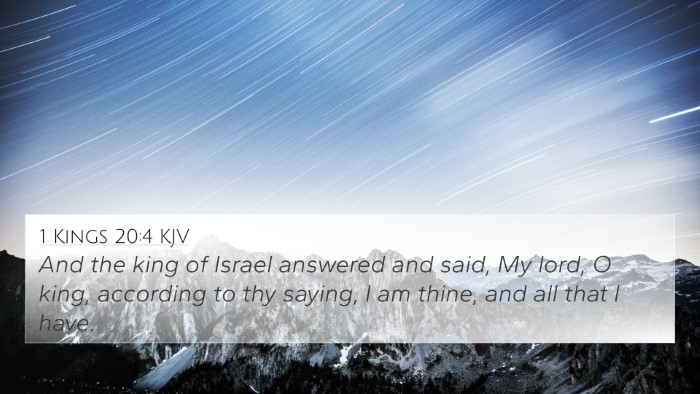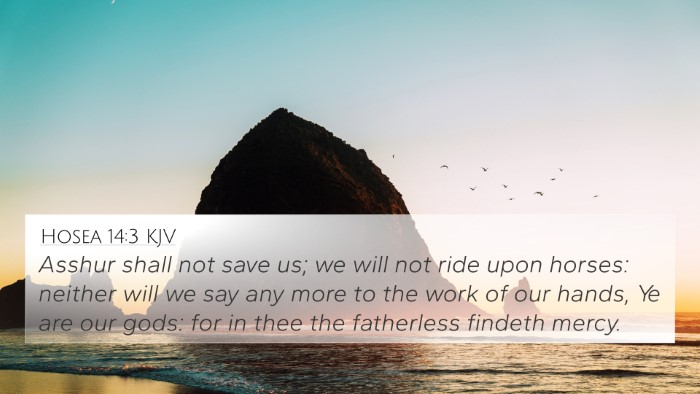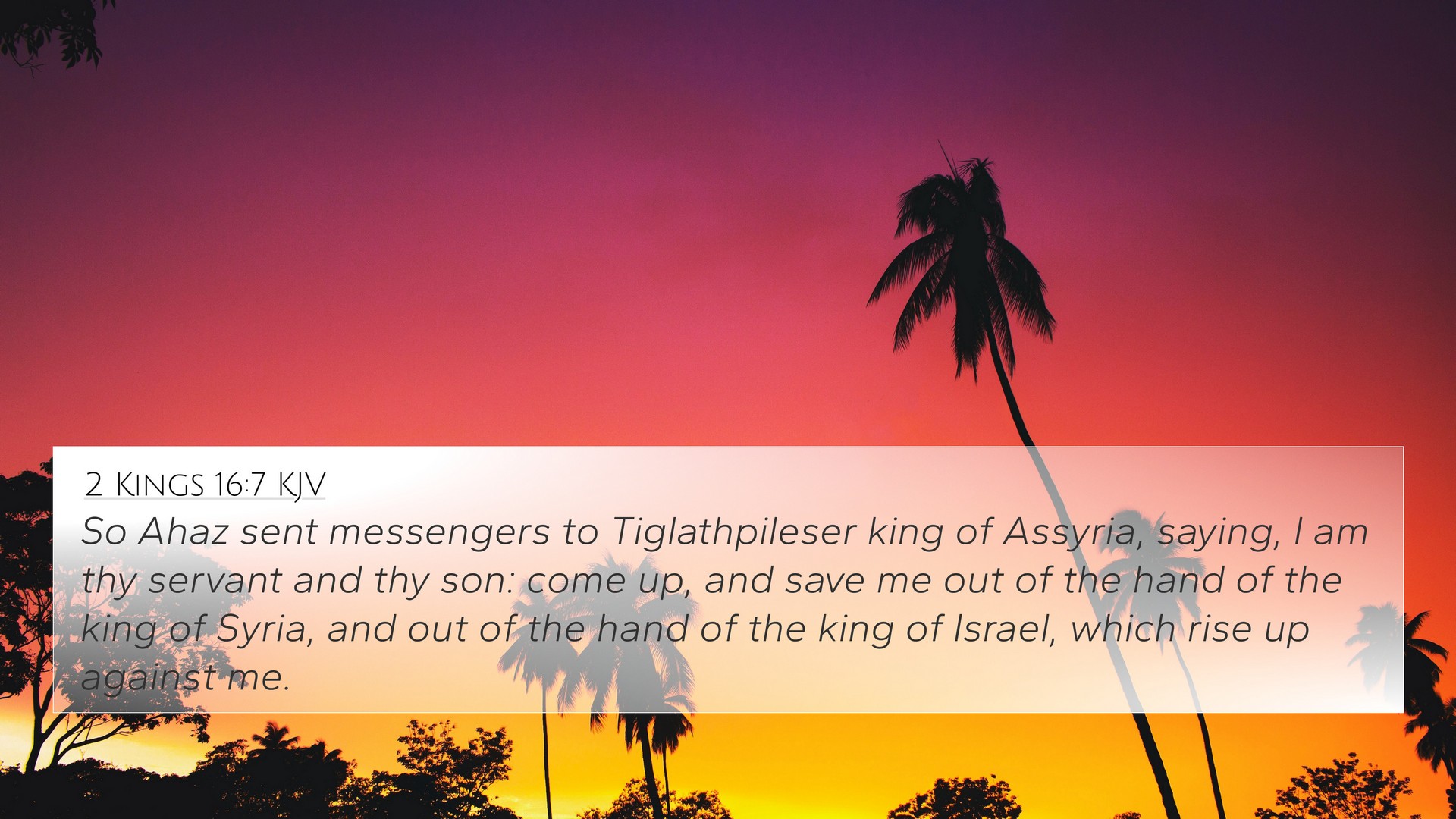Old Testament
Genesis Exodus Leviticus Numbers Deuteronomy Joshua Judges Ruth 1 Samuel 2 Samuel 1 Kings 2 Kings 1 Chronicles 2 Chronicles Ezra Nehemiah Esther Job Psalms Proverbs Ecclesiastes Song of Solomon Isaiah Jeremiah Lamentations Ezekiel Daniel Hosea Joel Amos Obadiah Jonah Micah Nahum Habakkuk Zephaniah Haggai Zechariah Malachi2 Kings 16:7 Similar Verses
2 Kings 16:7 Cross References
So Ahaz sent messengers to Tiglathpileser king of Assyria, saying, I am thy servant and thy son: come up, and save me out of the hand of the king of Syria, and out of the hand of the king of Israel, which rise up against me.
Uncover the Rich Themes and Topics of This Bible Verse
Listed below are the Bible themes associated with 2 Kings 16:7. We invite you to explore each theme to gain deeper insights into the Scriptures.
2 Kings 16:7 Cross Reference Verses
This section features a detailed cross-reference designed to enrich your understanding of the Scriptures. Below, you will find carefully selected verses that echo the themes and teachings related to 2 Kings 16:7 KJV. Click on any image to explore detailed analyses of related Bible verses and uncover deeper theological insights.

2 Kings 15:29 (KJV) »
In the days of Pekah king of Israel came Tiglathpileser king of Assyria, and took Ijon, and Abelbethmaachah, and Janoah, and Kedesh, and Hazor, and Gilead, and Galilee, all the land of Naphtali, and carried them captive to Assyria.

1 Kings 20:32 (KJV) »
So they girded sackcloth on their loins, and put ropes on their heads, and came to the king of Israel, and said, Thy servant Benhadad saith, I pray thee, let me live. And he said, Is he yet alive? he is my brother.

Lamentations 4:17 (KJV) »
As for us, our eyes as yet failed for our vain help: in our watching we have watched for a nation that could not save us.

Jeremiah 17:5 (KJV) »
Thus saith the LORD; Cursed be the man that trusteth in man, and maketh flesh his arm, and whose heart departeth from the LORD.

Psalms 146:3 (KJV) »
Put not your trust in princes, nor in the son of man, in whom there is no help.

2 Chronicles 28:20 (KJV) »
And Tilgathpilneser king of Assyria came unto him, and distressed him, but strengthened him not.

1 Chronicles 5:26 (KJV) »
And the God of Israel stirred up the spirit of Pul king of Assyria, and the spirit of Tilgathpilneser king of Assyria, and he carried them away, even the Reubenites, and the Gadites, and the half tribe of Manasseh, and brought them unto Halah, and Habor, and Hara, and to the river Gozan, unto this day.

1 Kings 20:4 (KJV) »
And the king of Israel answered and said, My lord, O king, according to thy saying, I am thine, and all that I have.

Hosea 14:3 (KJV) »
Asshur shall not save us; we will not ride upon horses: neither will we say any more to the work of our hands, Ye are our gods: for in thee the fatherless findeth mercy.
2 Kings 16:7 Verse Analysis and Similar Verses
Understanding 2 Kings 16:7
2 Kings 16:7 recounts an important episode in the reign of Ahaz, king of Judah, where he seeks assistance from Tiglath-Pileser, the king of Assyria. This act of reliance on a foreign power rather than on God highlights significant themes of faith, trust, and divine guidance in the Scriptures.
Commentary Insights
Below, we explore the meaning of this verse through insights gathered from public domain commentaries, including commentary by Matthew Henry, Albert Barnes, and Adam Clarke. This synthesis will provide a clearer understanding of its implications within the broader biblical narrative.
Meaning and Implications
- Trust in Assyria: Ahaz's decision to approach Tiglath-Pileser for help is seen as a major act of distrust in God. This notion stems from the Biblical principle that leaders should seek divine guidance before turning to foreign nations for aid.
- Political Desperation: Ahaz finds himself in a desperate political situation threatened by Israel and Syria. This prompts him to make an ill-advised alliance, demonstrating how dire circumstances can lead individuals away from divine reliance.
- God's Sovereignty: The act of seeking Assyrian help questions Judah's faith in God’s sovereign ability to defend them, echoing the warnings from earlier prophets who called for reliance on Yahweh.
- Contrast with Previous Kings: This action demonstrates a stark contrast with previous Judean kings who displayed faithfulness to God. Such comparisons help in understanding the spiritual decline of Judah during Ahaz’s reign.
- Prophetic Context: The context invites exploration of prophets like Isaiah, who were contemporaneous to Ahaz. These prophets cautioned against trusting in foreign alliances and advocated for faith in God’s deliverance.
Related Bible Verses
The following Bible cross-references enhance our understanding of 2 Kings 16:7 through thematic and narrative connections:
- Isaiah 7:1-2: This passage discusses the invasion of Judah by Israel and Syria, offering context for Ahaz’s fear.
- 2 Chronicles 28:16-21: Here, we see a narrative parallel that illustrates Ahaz’s reliance on Assyria and the consequences of his decisions.
- Isaiah 8:6-8: In this passage, God contrasts the help from Assyria with the waters of Shiloah that flow gently, indicating that true security lies in God.
- Psalms 146:3: This verse serves as a reminder not to put trust in princes, highlighting the futility of seeking help from human rulers.
- Deuteronomy 17:16-17: These verses provide wisdom against the king of Israel multiplying horses (or seeking alliances), emphasizing faith in God.
- Jeremiah 17:5: This verse declares a curse on those who trust in man, complementing the theme of faith and dependency on God over man.
- Micah 5:5: Reference to the deliverance brought forth through the true king, tying back into the faithfulness of God in dire times.
Thematic Analysis
The events of 2 Kings 16:7 raise essential reflections on the nature of faith, authority, and divine intervention. The overarching theme of reliance on God vis-à-vis human alliances is a recurrent motif throughout the Scriptures.
- Faith vs. Fear: Ahaz’s fear of the opposing kingdoms leads him to forsake faith in God, serving as a cautionary example for believers.
- Divine vs. Human Wisdom: The juxtaposition of divine wisdom against human strategy highlights the need for godly discernment in decision-making.
- Consequences of Distrust: The willingness of Ahaz to ally with Assyria reflects the broader consequences of distrust in God’s promises and plans.
Conclusion
In summary, 2 Kings 16:7 stands as a pivotal moment for the nation of Judah, illustrating the dangers of misplaced trust and the critical importance of looking to God in times of crisis. By examining this verse with cross-references and insights from public domain commentaries, we gain a richer understanding of its significance in the greater biblical narrative.
"The exploration of Ahaz’s actions and their repercussions encourage believers to seek God's counsel first, rather than relying solely on their strategies or those of the world."



